Samsung Galaxy Tab Pro 8.4 and 10.1 Review
by Jarred Walton on March 22, 2014 9:30 PM ESTLCD Testing: A Feast for Your Eyes
Let’s start out the testing by going straight to the biggest draw with the Galaxy Pro tablets: the WQXGA displays. Even without testing, I could see by looking that the colors on the Pro 10.1 looked a bit better/more natural than on the Pro 8.4, but I was curious to see if the colors were truly accurate or merely not as oversaturated. Depending on your display setting, it’s a little of both.
I tested the Pro 10.1 in four modes (“Auto”, Dynamic, Standard, and Movie), and contrary to what I’ve seen reported elsewhere, the Movie mode resulted in the most accurate colors. Most tablets and laptops often use white points that are far too hot (blue), and that applies to the 10.1 on the Dynamic and Standard modes, though Standard is a bit better perhaps; it also applies to the Pro 8.4 display. The Movie mode on the other hand clearly reduces the saturation levels and ends up being very good overall. Here are five sets of galleries showing the testing results for the various display modes on the 10.1 as well as the sole mode on the 8.4.
As for brightness, contrast, and DeltaE results, both models do reasonably well, again with the color accuracy advantage going to the 10.1. Keep in mind that the only other tablets in these charts just happen to be some of the best displays on the market, with the iPad Air being factory calibrated and the Nexus 7 being one of the best non-Apple devices in terms of color accuracy.
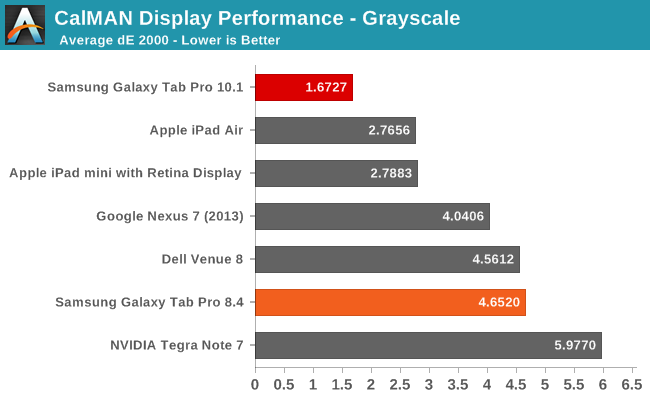
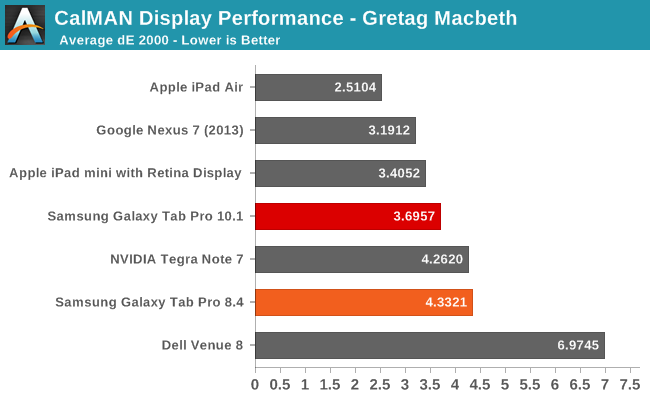
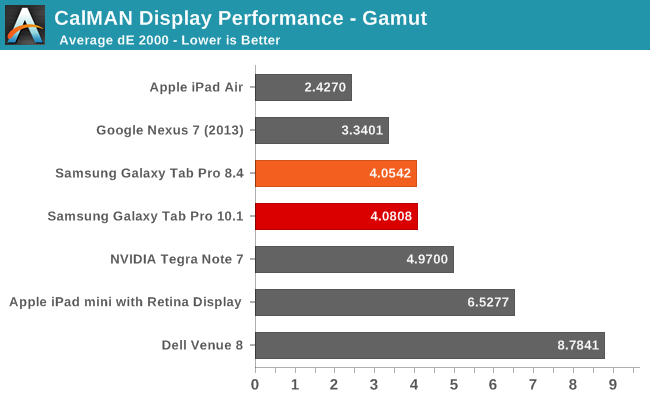
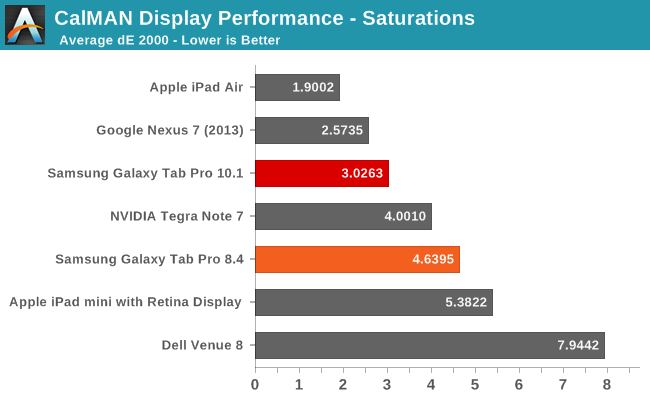
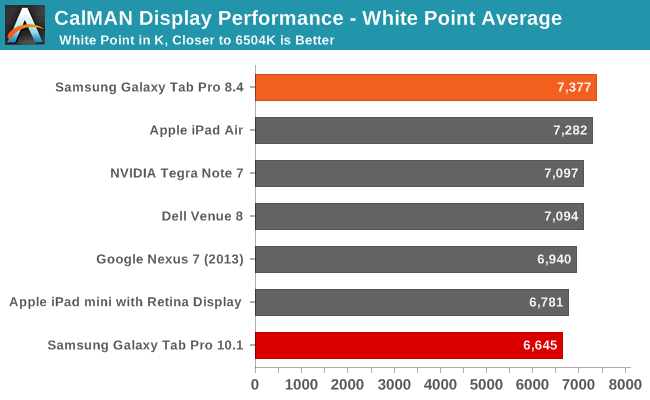
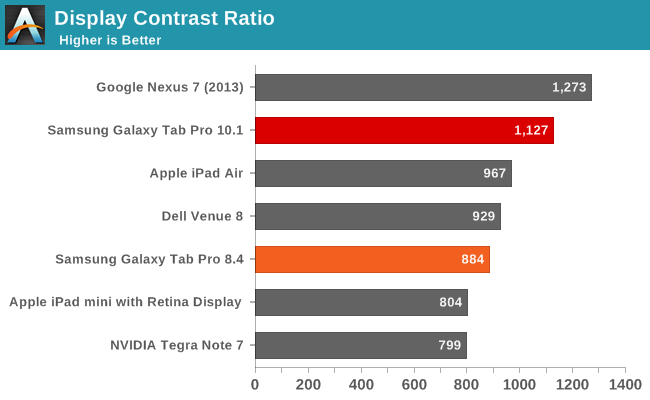
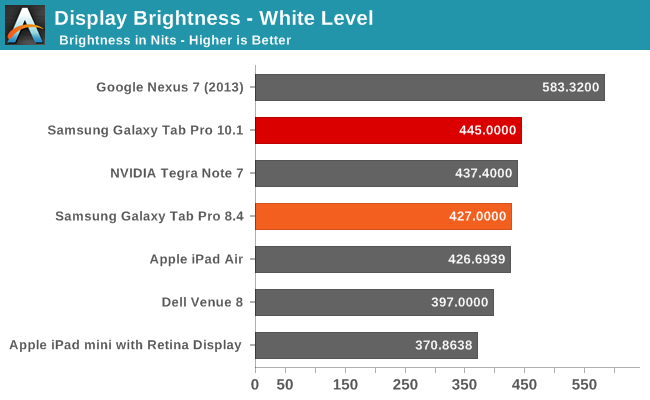
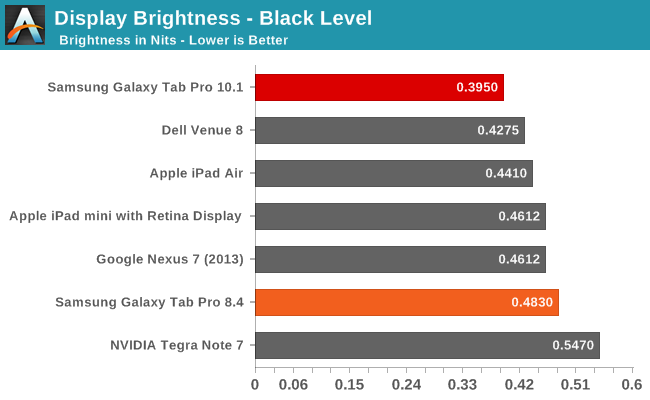
While none of the results are necessarily standouts (other than the grayscale dE 2000 on the Pro 10.1), we again have to keep in mind the fact that these are 2560x1600 panels in 10.1 and 8.4 inch devices. Factory calibration would push them over the top, but even without that they’re going to provide a wow factor to anyone used to lower resolution, lower quality displays.








































125 Comments
View All Comments
Reflex - Sunday, March 23, 2014 - link
1) Amazon is not in the business of selling a user to a third party, and in fact has strict internal policies for data use.2) Again, read the privacy policy. It is dramatically different from Google's. Amazon's goal is to sell you stuff directly, not to sell the customer as the product to third parties.
realtanu - Sunday, March 23, 2014 - link
+1theduckofdeath - Sunday, March 23, 2014 - link
"1) Amazon is not in the business of selling a user to a third party, and in fact has strict internal policies for data use."You could have fooled me with all of those 3rd party resellers using their portal. :)
Amazon does sell your information to third parties, they just do it using a slightly different model than Google.
Reflex - Sunday, March 23, 2014 - link
They actually do not. Create your own reseller via Amazon, anyone can do it. There are no options to purchase information on users, only information on your own product performance. Please actually read the agreements or set up a merchant account(free) to see for yourself. I know its popular to dismiss Google, Facebook and others with "Well everyone else does it" but there are several companies that do not and it is not any part of their business model. Amazon is one. Apple is another (and I dislike Apple, but facts are facts).R0H1T - Monday, March 24, 2014 - link
And you have definitive proof that Google sells your info to anyone else right ? AFAIK Google is known for targeted ads based on one's browsing history, through cookies which everyone else employs in the same way, or your gmail contents.Now the NSA/FBI/CIA et al have access to each of these firm's servers & data center residing in the US but that's the only thing(or entity) that has unrestricted access to your data, as for the rest I don't believe that Google shares everything they have on me & it's not like I have anything to hide nor have I put sensitive/personal info in public domain to begin with !
The user tracking you're alluding to is done the same way whichever firm you look at, the sharing of sensitive or personal info to non govt organizations is hard for me to believe because only FB does it, again AFAIK, & there's literally no proof of Google doing it in the manner what you've suggested.
grahaman27 - Saturday, March 22, 2014 - link
Most would consider it a massive drawback.Reflex - Saturday, March 22, 2014 - link
Given how well Amazon has done in the market I don't know that its 'most' actually. Some certainly do. Perhaps even many. But the Kindle devices are very large players in the space implying that for many it is not an issue.And again, better hardware, cheaper price, better security, better privacy, can sideload anything you need that isn't in the store.
JarredWalton - Sunday, March 23, 2014 - link
Better hardware? Or similar hardware? Better security? Doubtful -- different, yes, but not inherently better. Better privacy, perhaps. Sideloading is an option for all Android devices, so that's not really in the cards. Basically, it's as I said: if you can live without Google Play Services they're good devices.Reflex - Sunday, March 23, 2014 - link
Similar but Samsung is six months late and just prior to a new generation that will be coming later this summer. Furthermore they are more expensive with no significant improvements over the older hardware. And I will say 'better' because of build quality, the KF8.9 construction quality is excellent, something I have yet to see in any Samsung phone or tablet.The security of a curated app store is inherently better than the free for all that is Play services. I did not say that sideloading did not exist on others, only that if there is a must have app, you can get it on the Fire via sideloading if you need to.
And yes, if you need Google Play a KF is not a good device for you. But many people can live without it, as demonstrated by the KF marketshare.
JarredWalton - Sunday, March 23, 2014 - link
I'm like many in that I have purchased a number of apps via the Google Play Store over the past few years, which means shifting away from it I would lose over $100 worth of software. I suppose if I had started with the Amazon store I'd be in the reverse situation. I haven't spent time with the Kindle so I can't really say whether build quality is better, but I have no complaints with the Galaxy Pro offerings. Sure, the faux-leather plastic backing isn't the best thing ever, but it felt fine to hold and use on a regular basis.